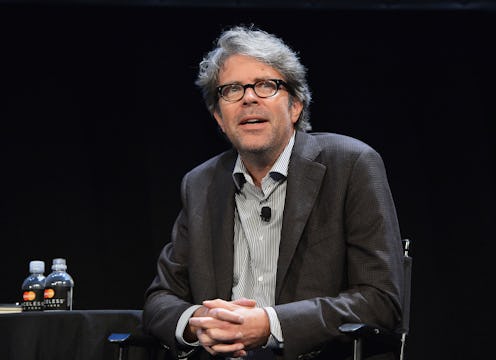Books
These Jokes May Be Why He Hates Twitter
Whether you love him or hate him, there's going to be more of him. According to The New York Times, Jonathan Franzen's new novel Purity will be released in September 2015. Farrar, Straus & Giroux will publish the novel, which will be Franzen's fifth, a "multi-generational epic that spans decades and continents," according to FSG president Jonathan Galassi. This "epic" nature of the novel should come as no surprise to those who know Franzen, as both The Corrections and Freedom were sprawling, lengthy books, too. According to Franzen, it's just his style:
I’ve let go of any illusion that I’m a writer of 150-page novels. I need room to let things turn around over time and see them from the whole lives of other characters, not just the single character. For better or worse, one point of view never seems to do it for me.
In that spirit, Purity will reach across contemporary America to South America and to East Germany before the fall of the Berlin Wall. It will center on a woman named Purity Tyler (OK, women, we can commence eye rolling now?), or "Pip," (that's a little better) who sets out to find her father. Galassi also promises it will involve mysterious family history that Franzen is well known for, hackers, and whistleblowers. Unlike his prior novels, Purity will have a magical realism and mythical quality to it, which Galassi calls "fabulist."
Although Franzen has picked up a National Book Award and was a Pulitzer Prize finalist, the author is just as well known for his opinions outside of the pages as he is his stories within them.
Franzen has made headlines before for his opinions on everything from the Internet to Oprah, which have firmly placed him in the controversial author camp. Some say his novels and public opinions make him elitist, and prefer to avoid his work, while others (and even some who don't care for the author personally) point firmly to his talent.
Franzen has derided both the state of literature today and e-books, which he said are "corroding values."
Franzen also rejected a nod from Oprah's Book Club for The Corrections — and maybe not for the commercialization reason you may have conjured. In an interview with NPR, he explained the effect Oprah would have on his book:
So much of reading is sustained in this country, I think, by the fact that women read while men are off golfing or watching football on TV or playing with their flight simulator or whatever. I worry — I'm sorry that it's, uh — I had some hope of actually reaching a male audience and I've heard more than one reader in signing lines now at bookstores say "If I hadn't heard you, I would have been put off by the fact that it is an Oprah pick. I figure those books are for women. I would never touch it." Those are male readers speaking. I see this as my book, my creation.
Then, in a talk at Tulane University, he, according to one of the audience members, spoke out against Twitter:
Twitter is unspeakably irritating. Twitter stands for everything I oppose ... It's hard to cite facts or create an argument in 140 characters … It's like if Kafka had decided to make a video semaphoring The Metamorphosis. Or it's like writing a novel without the letter 'P'… It's the ultimate irresponsible medium. People I care about are readers … particularly serious readers and writers, these are my people. And we do not like to yak about ourselves.
If Franzen doesn't like Twitter, it's clear that Twitter loves poking fun at him. After the Purity announcement, Twitter was quick to "yak about" the news:
No matter if you're pro- or anti-Frazen, this news is worth following because it's bound to spark a think piece or a dozen from now until late next year.
